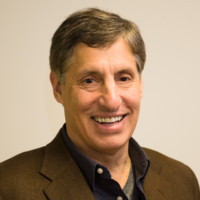Written by: Matthew Perez
Lon Levin was born in Brooklyn, New York and raised in Oceanside on the south shore of Long Island. As a teen, he spent most of his weekend evenings going to concerts in Manhattan witnessing acts that many can only imagine seeing live. These acts included the Allman Brothers, Crosby, Stills, Nash & Young, Stevie Wonder, and Carlos Santana. His love for music stemmed from his mother’s classical training as an opera singer as well as his father’s interest in live music. Lon’s father took him and his siblings to see the Beatles in their first New York appearance at Forest Hills Tennis Stadium. Lon’s musical appreciation was also not reserved for listening, he is a guitarist and still composes music today.
Lon has had an exciting and varied career, first as a lawyer and later as an executive and entrepreneur in the space and satellite industry. Throughout the 1980’s, Lon was one of very few attorneys specializing in satellite and space law. From there, he became an executive and serial entrepreneur in the space industry. Lon is most known as the co-founder of XM Satellite Radio, which was incorporated in 1992 and went into operation in 2001. For seven years, he was also the entrepreneur-in-residence at Lockheed Martin Space. Lon is now the president of Sky Seven Ventures, which invests, advises, and provides executive services for space and other technology businesses.
Lon attended Syracuse University College of Law from 1977 to 1980, where he was an editor for the Law Review. He says that his time on law review was critical to his development as a lawyer and businessperson. He credits the experience with teaching him discipline, how to conduct meticulous but efficient research, and how to write well. He explains that he was unenthusiastic about law school in his first year. The second year, however, he took Law and Technology with Professor Ted Hagelin, who would become a mentor and friend. In Hagelin’s class, Lon became excited about the law and intrigued by how technology was incorporated into society. This compelling interest has been the cornerstone of his career.
When Lon was attending law school in the late 1970s, cable television was the emerging new media and regulators had difficulty keeping up with industry innovations. This legal challenge was the focus of his note topic. Lon wrote an extensive article covering many aspects of cable television regulation. The note was rejected by the editors as too unwieldy and unfocused. With the help of Professor Hagelin and his law review editors, Lon pared down his note to one controversial aspect of cable television regulation—federal and state franchise fees. Within just two drafts, his article was selected for publication. While Lon has a plethora of astounding professional accomplishments, one he holds dear is having his note published after only two drafts.
On the strength of the note and his passion for telecommunications and technology law and regulation, Lon was recruited to work at the Federal Communications Commission. He quickly worked his way to the FCC’s Satellite Division and from there never looked back.
Lon was already working in the satellite industry when he started XM Satellite Radio, which he ran for its first six years, and later stayed on as a senior executive. XM was the culmination of Lon’s love of music and his desire to put technology in the hands of consumers. He feels fortunate to have had the help of a very talented team. When asked whether he was concerned whether satellite radio would work, he says he never doubted the idea but in the early years he worried that he and his team might not be the ones to implement it. When asked about the historical significance of satellite radio, Lon says he is proud to have helped create a technology that makes people feel good and have access to music wherever they go across the continent. The most rewarding aspect of creating XM Satellite Radio is when a stranger learns his role and thanks him.
Lon’s professional accomplishments are unrivaled. When asked what advice he would give his younger self, he said he would say “stop worrying so much”— a message that we as students could likely use as we complete law school.

